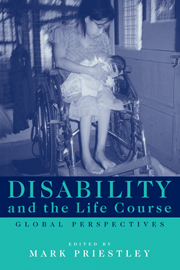Book contents
- Frontmatter
- Contents
- List of figures
- List of tables
- Notes on contributors
- Preface
- Acknowledgements
- A brief note on terminology
- I Concepts
- II Methods and stories
- III The politics of transition
- 13 Disabled children: an emergency submerged
- 14 Failing to make the transition? Theorising the ‘transition to adulthood’ for young disabled people
- 15 Breaking my head in the prime of my life: acquired disability in young adulthood
- 16 Work and adulthood: economic survival in the majority world
- 17 The possibility of choice: women with intellectual disabilities talk about having children
- 18 Ageing with disability in Japan
- 19 Ageing with intellectual disabilities; discovering disability with old age: same or different?
- 20 Epilogue
- Index
20 - Epilogue
Published online by Cambridge University Press: 30 September 2009
- Frontmatter
- Contents
- List of figures
- List of tables
- Notes on contributors
- Preface
- Acknowledgements
- A brief note on terminology
- I Concepts
- II Methods and stories
- III The politics of transition
- 13 Disabled children: an emergency submerged
- 14 Failing to make the transition? Theorising the ‘transition to adulthood’ for young disabled people
- 15 Breaking my head in the prime of my life: acquired disability in young adulthood
- 16 Work and adulthood: economic survival in the majority world
- 17 The possibility of choice: women with intellectual disabilities talk about having children
- 18 Ageing with disability in Japan
- 19 Ageing with intellectual disabilities; discovering disability with old age: same or different?
- 20 Epilogue
- Index
Summary
Life can be a complex, often messy, business and people's life experiences do not fit neatly into academic disciplines or theoretical models. The life experiences represented in this book are diverse, yet disability is not simply about diversity. It is also about commonality – not a commonality of embodied experiences but a commonality of purpose, in the struggle for a more inclusive society. In these final remarks, I will draw on a number of themes arising from the preceding chapters. In particular, I will argue that a life course approach can be useful in revealing more clearly the relationship between lived experience and the broader socio-economic context, and that it enriches the development of disability studies. In so doing, I also hope to raise a number of questions.
Reviewing the book as a whole, I am struck both by its strengths and its weaknesses. Clearly, it would not have been possible to offer a comprehensive or ‘representative’ account in a single volume such as this. However, the chapters do present a very wide range of life course experiences and issues, in different countries, across different generations, and from different perspectives – personal, political and theoretical. The stories, and the issues they raise, blur the boundaries of public and private, of the personal and the political. They raise questions not only about disability, age and generation, but also about class and caste, gender, race and ethnicity.
- Type
- Chapter
- Information
- Disability and the Life CourseGlobal Perspectives, pp. 240 - 248Publisher: Cambridge University PressPrint publication year: 2001
- 1
- Cited by

